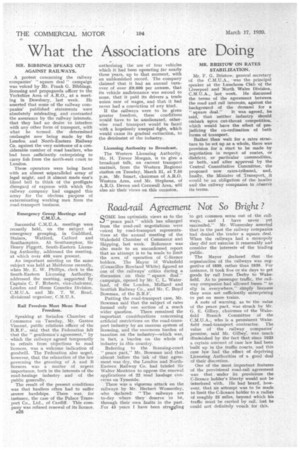Road-rail Agreement Not So Bright ?
Page 46

If you've noticed an error in this article please click here to report it so we can fix it.
SOME less optimistic views as to the peace pact " which has emerged from the road-rail negotiations were voiced by road-transport representatives at the annual meeting of the Wakefield Chamber of Commerce and Shipping, last week. Reference was also made to an unconfirmed report that an attempt is to be made to limit the area of operation of C-licence holders. The Mayor Of Wakefield (Councillor Rowland White) figured as one of the railways' critics during a discussion on their square deal" campaign, opened by Mr. C. L. Waterland, of the London. Midland and Scottish Railway Co., and Mr. C. Boyd Bowman, of the B.R.E.
Putting the road-transport case, Mr. Bowman said that the subject of rates formed only one section of a much wider question. There remained the important considerations concerning artificial restrictions on the road-transport industry by an onerous system of licensing, and the enormous burden of taxation on the industry—which was, in fact, a burden on the whole of industry in -this country. Referring to the licensing-court " peace pact," Mr. Bowman said that almost before the ink of that agreement was dry, the London and NorthEastern Railway Co. had briefed Sir Walter Monkton to oppose the renewal applications of 22 road haulage concerns on Tyneside.
There was a vigorous attack on the railways by Mr. Herbert Womersley, who declared: "The railways are to-day where they deserve to be, through their own faults in the past. For 45 years I have been struggling to get common sense out of the railways, and I have never yet succeeded." Mr. Wornersley asserted that in the past the railway companies had denied the trader a square deal. When the railways had a monopoly they did not exercise it reasonably and consider the interests of the trading public.
The Mayor declared that the organization of the railways was suggestive of 1839, rather than 1939. For instance, it took five or six days to get goods by rail from Derby to Wakefield. As to passenger traffic, the railway companies had allowed buses " to slip in everywhere," simply because they were not sufficiently enterprising to put on more trains.
A note of warning, as to the value of the peace pact, was struck by Mr. G. E. Gilbey, chairman of the Wakefield Branch Committee of the C.M.U.A., who is a prominent -Wakefield road-transport contractor. The value of the railway companies' promise, said Mr. Gilbef, was much diminished by the fact that since 1933 a certain amount of case law had been built up in the traffic courts, and this case law had the effect of depriving Licensing Authorities of a good deal of their discretion.
One of the most important features of the provisional mad-rail agreement was that, under its provisions the C-licence holder's liberty would not be interfered with. Ile had heard, however, that an attempt was to be made to limit the C-licence holder to a radius of roughly 25 miles, beyond which his traffic must be carried by rail, but he could not definitely vouch for this.




















































































